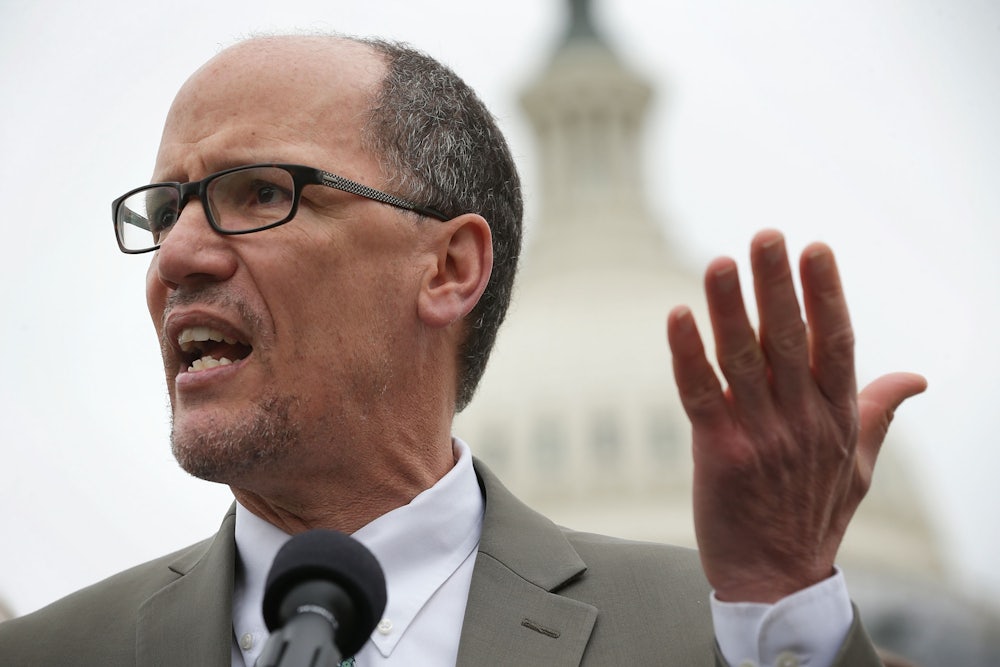On Saturday, Tom Perez was voted the chair of the Democratic National Committee. Perez, who has never held or run for national elected office, served as labor secretary in the Obama administration. He was urged to run after establishment figures—and especially former members of the Obama administration—grew concerned that progressive congressman Keith Ellison of Minnesota would become the next DNC head. Ellison had garnered the endorsements of a wide range of Democrats, including Representative John Lewis and Senators Bernie Sanders, Chuck Schumer, and Elizabeth Warren.
Ellison’s identity as a black Muslim and his progressivism—particularly his pledge to get lobbyists and corporate money out of the DNC and instead focus on Bernie-ish small donations to build up the local Democratic establishment—clearly made some in the party uncomfortable. This, despite the fact that Ellison’s record and profile made him an ideal choice to lead a party that wants to run on a platform of diversity and economic equality.
Perez’s backers have pointed to the former labor secretary’s strong progressive record, which is undeniable (although his history with the banking industry, in particular, is concerning). But as my colleague Clio Chang pointed out earlier this week, the argument made by party stalwarts that Perez and Ellison were cut from the same progressive cloth simply didn’t hold water—if that were true, then why the need for Perez to enter the race in the first place?
Much has been made about the left wing’s fixation on the race. Some have grumbled that it has been turned into a rehash of the 2016 primary between Sanders and Hillary Clinton. Progressives should be happy with Perez, the argument goes, who was one of the most progressive labor secretaries in history. Some have also argued that this conflict has been manufactured by a progressive wing that has become unhinged in its obsession with the DNC and the national party establishment.
There is a degree of truth here. But the argument for the most part is a red herring. The progressive wing of the Democratic Party did not cook up this fight: The establishment wing did. Before Perez entered the race, the party was coalescing around Ellison as the natural choice to lead the party. The establishment that has spent the last three months whining about the DNC race becoming a proxy battle was responsible for creating that proxy battle in the first place. Even richer are the establishment types who say the role of DNC head isn’t important enough to warrant such scrutiny—then why so much effort to get Perez in?
The selection of Perez over Ellison suggests that the party establishment is still uneasy with progressives, many of whom are bringing energy to state and local elections that hasn’t been there for years. By choosing Perez, the party is once again saying it doesn’t trust progressives.
And, as Chang wrote this week, the fact that the role of DNC chair is not as all-powerful as some assume only makes the case for Ellison stronger—that he was denied the role suggests that the party is unwilling to make even relatively minor concessions to progressives when it comes to party power.
But there’s another reason why Democrats—not just progressives—should be concerned. The 2016 election was a disaster: A proto-fascist is in power, both houses of Congress (and soon the Supreme Court) are in the GOP’s hands, and the Democratic Party is weaker at the state level than it’s been in several generations. This was proof that the party needed to be shaken up and to try new things. In Perez, Democrats have made a small step in that direction, but they have also signaled that they don’t believe a major course correction is in order and that they are reluctant to make significant reforms. The silver lining of Perez’s victory—and of the needless proxy war that establishment figures provoked by urging him to run—is that he will have to do a great deal to regain the trust of the left.
Ultimately, the race for DNC chair doesn’t really resemble the 2016 primary, which resulted in an establishment nominee who lost to the weakest general election candidate in living memory. But it does suggest that Democratic officials have learned the wrong lessons from it.
Editor’s note: A previous version of this article incorrectly stated that Perez has not held an elected political office. He was elected to the county council in Montgomery County, Maryland, in 2002, and served on the council until 2006. We regret the error.
